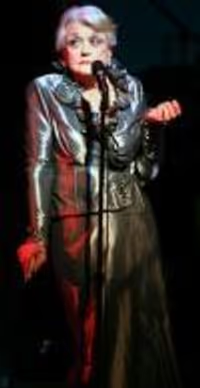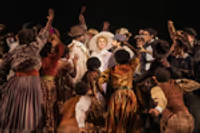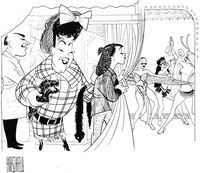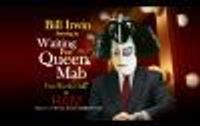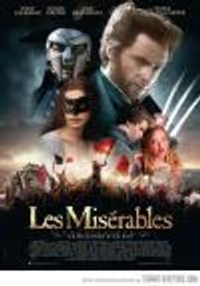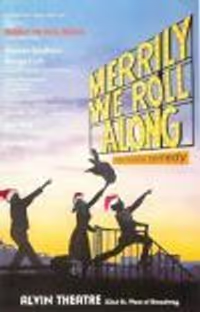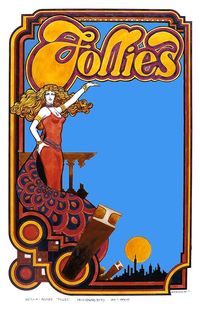FOLLIES - The Intermission is Back
After Eight
Broadway Legend Joined: 6/5/09
#75FOLLIES - The Intermission is Back
Posted: 8/31/11 at 7:07am
"As in their creative instinct to keep the show focused on it's original intent and not succumb to blue-hair complaints."
Oh, for heavens sake, enough with the ageism, enough with the snobism, enough with the put-downs of audiences! If the show can't hold an audience's attention, it's the show's fault, not the audience's. That's all the "artistic merit" one needs to discuss here. If A Chorus Line or the film of Titanic could keep an audience engaged without an intermission, it's because they were good enough. Follies is not. It's as simple as that. And quite frankly, it couldn't hold my attention even with an intermission. And that was long before I became, if not a "blue hair," then certainly a graybeard.
Phyllis Rogers Stone
Broadway Legend Joined: 9/16/07
#76FOLLIES - The Intermission is Back
Posted: 8/31/11 at 11:47amYou sure like to post in the threads about it, though.
#77FOLLIES - The Intermission is Back
Posted: 8/31/11 at 12:11pm
^ What is that supposed to mean?
You do the same thing, Phyl. i.e., post criticisms in a threads on a subject you've commented on before. Again and again. (Dreamgirls movie or Chicago movie or Nine movie, anyone?) How about all the posters who have crapped all over that Judy Garland show or Porgy & Bess (in both cases without seeing it) in many posts, but come back for more?
Is it just that you don't like it when it's a subject near and dear to you?
blocked: logan2, Diamonds3, Hamilton22
Phyllis Rogers Stone
Broadway Legend Joined: 9/16/07
#78FOLLIES - The Intermission is Back
Posted: 8/31/11 at 12:15pmI usually say positive things about the Chicago movie.
Broadway Legend Joined: 12/31/69
#79FOLLIES - The Intermission is Back
Posted: 8/31/11 at 1:25pm
"And quite frankly, it couldn't hold my attention even with an intermission."
So you are probably not the best person to ask if it works better with or without an intermission?
#80FOLLIES - The Intermission is Back
Posted: 8/31/11 at 9:09pm
Saw the show again this afternoon. Intermission was there, and felt right with the 'matinee crowd.' I could only imagine how restless that crowd would be without an intermission. I would still love to see it without one, but I've accepted that the intermission will be staying. The show let out around 4:35.
The production is in TIP TOP shape, it honestly keeps improving and improving. This was the absolute best that I've ever seen Burstein, Maxwell, and Paige. They were just sensational.
Paige has almost totally changed her interpretation of 'I'm Still Here.' It's all for the better now. She stopped trying as hard to sell every single lyric. It all flows better now, and her ending is thankfully less angry.
A few parts of the show have been restaged, nothing too major. Something I had not noticed at the first preview: during the 'Montage' ending section of 'Broadway Baby,' all of the onlooking partygoers freeze until the number is finished. It brought the right amount of surrealism to the number.
Bernadette's entrance felt a bit rushed this time, but her exit has only gotten even better. She is truly doing some wonderful acting up there!
I really hope this production receives the GREAT reviews it deserves!
#81FOLLIES - The Intermission is Back
Posted: 8/31/11 at 10:16pm
Jay,
Was this your first time seeing the re-staged "Jessie and Lucy". Does Maxwell seem more comfortable.
What I do not understand is that she had a hard time doing the latter song but really hoofs it in "Who's that Woman". Just very interesting.
#82FOLLIES - The Intermission is Back
Posted: 8/31/11 at 10:21pmljay - I love your avatar.
TheHappyPhantom
Featured Actor Joined: 8/25/11
#83FOLLIES - The Intermission is Back
Posted: 8/31/11 at 10:43pm
"So you are probably not the best person to ask if it works better with or without an intermission?"
Exactly. Not interested in this dudes opinion.
#84FOLLIES - The Intermission is Back
Posted: 8/31/11 at 11:09pmIt's not her fault. It's the choreographer's.
#85FOLLIES - The Intermission is Back
Posted: 8/31/11 at 11:22pm
Lucy and Jessie appeared to be the same choreography as the first preview. Maxwell is really selling it, but I think it could be much better. My sister, a totally Follies novice, singled out Lucy and Jessie as the standout number in Act 2. So, who knows?
Also, Bernadette was in GREAT voice today. Her upper register was crystal clear, she sounded lovely.
Updated On: 8/31/11 at 11:22 PM
#86FOLLIES - The Intermission is Back
Posted: 8/31/11 at 11:33pmTrust me I know it is not her fault. I was just curious if she was adjusting to it.
#87FOLLIES - The Intermission is Back
Posted: 8/31/11 at 11:34pmI'm fascinated as to why the show itself (not necessarily this production) is hitting so many nerves, for some people. Is it because there are subjects/stories within it that are too hard to confront? Were they expecting a light evening full of follies style songs? I understand it's not everyone's cup of tea. But the anger and venom the show is filling some people with is quite curious, to me.
#88FOLLIES - The Intermission is Back
Posted: 9/1/11 at 12:24am
Saw the matinee today as well. I sort of wished there wasn't an intermission, if only because of some of the stuff I overheard during it made me frustrated with the people in the audience. I always forget that the majority of the audience isn't as nerdy about musicals or especially Sondheim as myself and the people on this board.
It was my first time seeing the show, I've listened to the music a lot and read a lot on the board, so I was familiar with the plot, but this was the first time I saw it unfold. I was surprised at how little we got from the young characters in terms of story. I was expecting more explanation as to why things actually ended up the way they did, which made it a bit hard for me to invest in the story completely. Has the show always been that way, only hints of fights and declarations, and that one meeting with the boys calling up over and over, or have the book revisions cut out a lot of backstory?
The performances were all fantastic. I wished the audience was into it a little more, particularly with the humor, but that's what I get for going to a Wednesday matinee.
TheHappyPhantom
Featured Actor Joined: 8/25/11
#89FOLLIES - The Intermission is Back
Posted: 9/1/11 at 1:20am
I'm fascinated as to why the show itself (not necessarily this production) is hitting so many nerves, for some people. Is it because there are subjects/stories within it that are too hard to confront? Were they expecting a light evening full of follies style songs? I understand it's not everyone's cup of tea. But the anger and venom the show is filling some people with is quite curious, to me.
That's exactly why! Sondheim challenges his audiences. His musical theatre requires an intelligent audience that's willing to engage not just watch jazz hands and can cans all night. Most bway audiences are far too shallow or lazily minded to fully grasp and appreciate his work.
bwayfan7000
Broadway Legend Joined: 3/28/09
#90FOLLIES - The Intermission is Back
Posted: 9/1/11 at 1:56amE. Davis, I have been wondering the exact same thing about Who's That Woman? vs. Lucy and Jessie. Perhaps it's because Maxwell is front-and-center for the latter and so we're seeing her discomfort with the dance moreso, or perhaps she feels more pressure during that number and underperforms it as a result, but the second time I saw it (which, by the way, was last Wednesday's matinee, when there was an incredibly responsive audience, even without the intermission), I watched Maxwell for a lot of Who's That Woman?, and she was hitting all her marks in the choreography just fine. Then again, I also thought the staging was at least a bit if not fairly significantly improved from DC. Nonetheless, I don't think it really takes away from the fact that Maxwell makes an absolutely stunning, and award-worthy, Phyllis. And, meanwhile, I think at this point in the run, Bernadette is finally giving a performance equal to hers. I thought so when I saw it last week, and posters seeing it now have led me to believe she's grown even further since I saw it.
#91FOLLIES - The Intermission is Back
Posted: 9/1/11 at 6:47am
I saw the matinee yesterday as well, and I agree with Ljay that Bernadette was in amazing voice. After some of the recent comments on here I went in cautious, but, to pull a lyric from the show, my fears were gone after her first note. Her transitions from chest to head felt effortless, and that's never been a particularly easy passageway for her, so I was surprised. The four leads all looked and sounded great yesterday--Burstein seemed particularly "on," and "The Right Girl" was electric--and the ensemble is practically flawless. I already have plans to go back next week.
The intermission didn't lessen my enjoyment of the performance in any way; it just feels so unnecessary to stop the show and then pick up, twenty minutes later, in the exact same moment. It does lessen the power of Buddy's confrontation of Sally and the impact of "The Right Girl," because it doesn't feel as immediate as it should. I would have loved the opportunity to see it without an intermission but I'll live.
And the matinee crowd yesterday was maybe the most geriatric I've ever seen--and I go to a lot of matinees. Walkers, wheelchairs, oxygen tanks, all out in full force. Lots of crinkling wrappers and stage whispering. Half my row was asleep before Bernadette made her first entrance, but they all woke up to clap at the appropriate moments.
Phyllis Rogers Stone
Broadway Legend Joined: 9/16/07
#92FOLLIES - The Intermission is Back
Posted: 9/1/11 at 1:16pmlull, for the most part, that is how the young four's scenes have always been written. The 1987 London production (with a book that was more or less completely rewritten) grounds those scenes a little more than any other version, but that version is so weak all around that the little glimmers of extra info you get from those scenes aren't really worth it.
#93FOLLIES - The Intermission is Back
Posted: 9/1/11 at 6:00pmEric Schaeffer said in an interview that he made the end of the first act a little more interesting for b'way --- is this true? I assume it still ends with Too Many Mornings? (one of the most beautiful songs in the show, IMHO)
#94FOLLIES - The Intermission is Back
Posted: 9/1/11 at 11:04pm
From Finishing The Hat:
Sondheim, on revisions and additional songs written for subsequent versions of FOLLIES, after the original production:
"Although none of the new songs was much of an improvement- "Country House" was too harsh a style for the score (it would have been better suited to Company), [the new] "Loveland" was unnecessary and "Make The Most of Your Music" was too elaborate and expensive to stage easily- "Ah But Underneath" has proven useful as a substitute for "The Story of Lucy and Jessie" in subsequent productions where the woman who plays Phyllis is more a singer than a dancer. It would be easy to say that otherwise I wasted my time writing these songs, but that wouldn't be entirely true: there is always value in trying different things. The axiom that "If it isn't broke, don't fix it" is a valuable truism in the theater, but Follies is a show that's a bit crippled by its size, ambition, and mysteriousness and thus always worth the effort of experimentation- if only it were produced more often."
God bless the current Kennedy Center revival for trying the show with an intermission- AND without an intermission- AND with an intermission again. "There is always value in trying different things."
God bless 'em for their passionate production, for trying different things, 'and for making Follies HAPPEN ON BROADWAY.
"If only it were produced more often."
bk
Broadway Legend Joined: 7/20/03
#95FOLLIES - The Intermission is Back
Posted: 9/2/11 at 1:06am
"The performances were all fantastic. I wished the audience was into it a little more, particularly with the humor, but that's what I get for going to a Wednesday matinee."
You'll get that at any performance that isn't loaded with musical theatre teens, Sondheim freaks and Follies freaks. That's the way it is.
As to the endless geriatric comments - I'll take them any day of the week over the screaming, overwrought, whooping and hollering by those who feel they have to make their presence known - almost as if they were trying to top each other - it's all about the audience now.
FindingNamo
Broadway Legend Joined: 7/22/03
#97FOLLIES - The Intermission is Back
Posted: 9/2/11 at 9:27am
Eric Schaeffer said in an interview that he made the end of the first act a little more interesting for b'way --- is this true? I assume it still ends with Too Many Mornings? (one of the most beautiful songs in the show, IMHO)
There's no coup-de-theatre at the end of Act 1; it's the same as any other Act 1 ending of FOLLIES I've ever seen. *SPOILER* After "Too Many Mornings," Ben and Sally kiss and Buddy walks in on them. The lights come up and it picks up at the exact same moment at the top of Act 2. *END SPOILER*
#98FOLLIES - The Intermission is Back
Posted: 9/2/11 at 9:34am
Dear bk- it's always been all about the audience. Or perhaps it should be. That's why it's called COMMERCIAL theatre. That's why is called show BUSINESS. And believe me, I'm all for it. ANTIGONE and MEDEA didn't run because they existed in some Eleysian vacuum- they were, and remain, popular pot-boilers of the best kind. And TOSCA has become more than the "shabby little shocker" it was originally deemed. Of course, it's all about pleasing an audience (or awakening it, edifying it, exhorting it, educating it, etc.- but always entertaining it). What else is theatre for?
And dear Ms. Plotka, don't confuse anger and venom with passion. George Oppenheimer once published a volume entitled "The Passionate Playgoer", an apt description of many of us, even if such passion is not always adequately expressed.
bk
Broadway Legend Joined: 7/20/03
#99FOLLIES - The Intermission is Back
Posted: 9/2/11 at 9:59amYou can't honestly be so convoluting my post, can you? No. You know exactly what I mean when I say it's all about the audience now. It's about them making a lot of noise as if they were watching an episode of American Idol. It's disruptive, not real, and awful. I've been to some of the greatest shows ever written and none had that kind of craziness and yet the audiences loved them and showed their appreciation without behaving like they were at a rock concert. I hope that's clearer for you.
Videos




